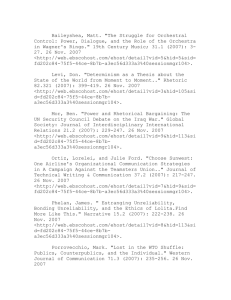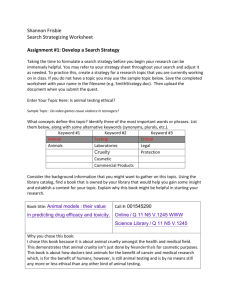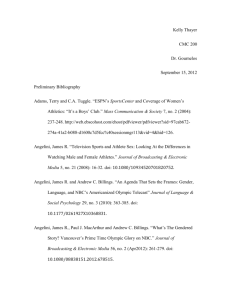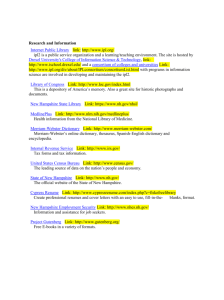Educational History Research By AMIRAH FARZAN Master in
advertisement
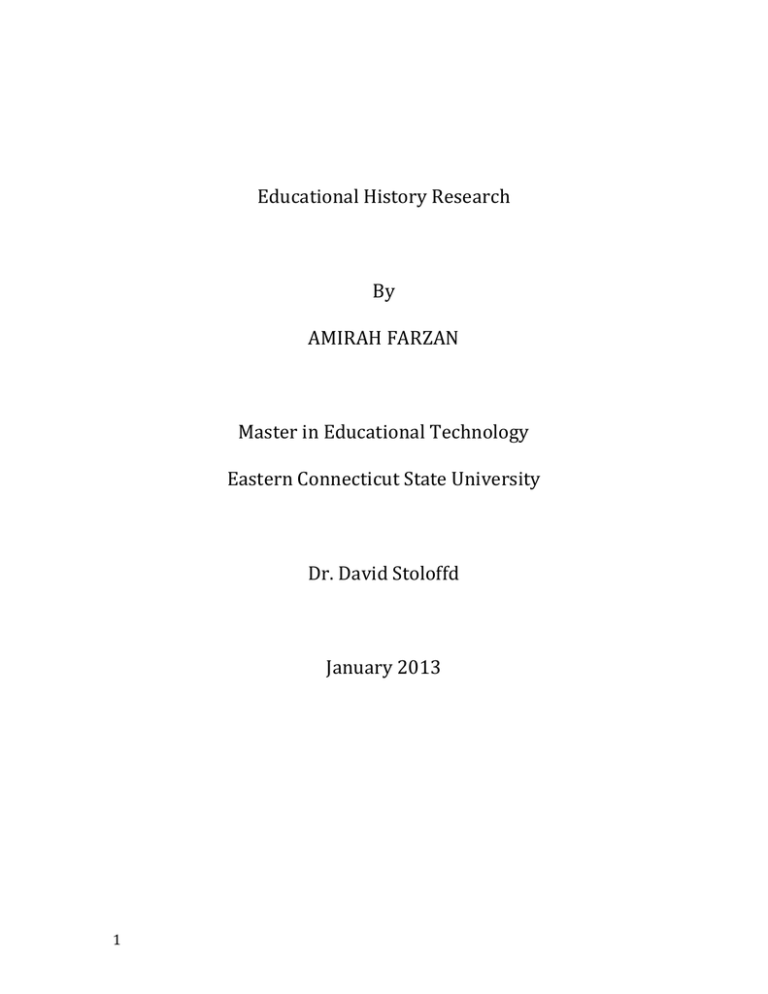
Educational History Research By AMIRAH FARZAN Master in Educational Technology Eastern Connecticut State University Dr. David Stoloffd January 2013 1 In my research paper I choose five different events for the American Education History. I choose them by what I believe that was the important events at that age. In order, they are 1690- New England book, 1743- Benjamin Franklin, 1817- The First Permanent School for Deaf open, 1953- B.F. Skinner’s, and 2007- Cho Seung-Hui (Virginia Tech University). These events make or represent what the education has been through in the United States several years ago until our days. 2 1690- The New England Primer. In the late of the 16th century and the beginning of the 17th centaury Benjamin Harries published his book “The New England Primer” in Boston for the American Colonies. It was the first reading book at that time which was talking about many thoughts from King James Bible. At that time this book knew as “Little Bible of New England”. It was useful book to know about reading in general. They used the alphabet, vowels, consonant and other syllables just to make children know how to read. The objective of the book was almost about their environment and how is the war and religion affect their society. In other words, the objective of this book was mostly religion. Deaths, judgment, punishment, hope, moral are examples from what they learn. The book was organized by alphabet, which is a culture production for the book. “In Adam’s Fall we Sinned all”, “ Thy Life to Men This Book Attend”, A Dog will Bit” these are some examples of the 3 textbook. “First words should be words with a religious significance, it was especially encouraged to say such words as “God”, “ Jesus”, “Faith”, “love”.” David H. Watters. Until the 20th century they still publish this book but the society and the meaning of death has been changed since that time and now. 4 1743- Benjamin Franklin Inventor, philosophy, author, political, science, and musician are some names that describe Benjamin Franklin. He was an American citizen who born in Boston. He started his way of education since he was teenager until he became 83 years old. He educated himself after 2 years in a formal school by reading some of his favorites books such as “Pilgrims Progress, The Dialogues of Plato, and ethical essays of Cotton Mather”. He believed that thinking, reading, and writing could bring happiness to your life. This was his way to learn by him self. When he opened his first Academy in Pennsylvania “The Pennsylvania Academe” he used to teach his students in the same way that he learned by himself. He published some of his written work through his brother journal and that was just the beginning to become an author. At that time he identified the 13 central virtues of human character such as Resolution, Justice, Silence, etc. Moreover, he invented the lightning rod, 5 bifocals, the Franklin stove, a carriage odometer, and the glass harmonica. All his life he was expressing the American thoughts and action through his written work or his inventions. He concentrated in the both side of self-function and the public function as well. 6 1817- The first Permanent School for Deaf open. The first school for the deaf people was located in Hartford, Connecticut. Thomas Hopkins and Laurent Clerc had established the school for the deaf. The idea of educating deaf people inspired from a little girl, Alice Cogswell, who was uneducated because she was deaf. Her father was a doctor and a friend to Gallaudet who moved to England just to find someone to help him learning sign language. He met Laurent Clerc who was a brilliant deaf student lived in Paris. Gallaudet studied the methods of Europe that he learned from Clerc and taught him the English language. After that, he convinced Clerk to come with him to The United States and teach the children and some teachers the sign language with him. They moved to Hartford and start their teaching with 7 students including Alice. In 1817, they open the school under the name of “ The Connecticut Asylum for the Education and Instruction of Deaf and Dumb Persons” after period of time they change it in to “ 7 The American School for the Deaf”. The problem that no one try to educate the deaf people at that time was that the scientist did not know the cause of being a deaf person so they did not try to find a way to communicate with them like European countries did. In some of the written works for the deaf student shows a little difference in grammar that shows their sign language. By the time teachers found some solutions for such problems. 8 1953- B.F. Skinner’s “ Science and Human Behavior”. He was a professor at Harvard University in 1958. He started his life as an author and took his bachelor degree in literature at that time. By the time, he found that he is not a writer and he did not have anything to write about. As a reason, he attended the psychology graduate school and started his way in psychologist field. He became psychologist, behaviorist, author, inventor, and social philosopher. He studied the human and animals behavior in some of his research. Moreover, according to his studied he published his theory under the name “Radical Behaviorism”. He had some theories about studying public that goes under methodological behaviorism; and privet goes under privet. In the 19th and 20th century he agree that the mind and brain are synonyms. Moreover, he said that we could find some creativity in the class behavior. One of the most of his theories was about operant conditional that is the cause of an action. Also, 9 variation and selection are the keys for it. Every thing in our behavior is about our experience through our life. Punishment and reward are the function of what we do. From his work in behavior he invents what we call it now the skinner box. He published 21 books and 180 articles one of his books is “Verbal Behavior”. 10 2007- Cho Seung- Hui “ Virginia Tech University”. In the Virginia Polytechnic Institute and State University a massacre happened. The murder was 23 years old, senior originally from South Korea. When he was eight years old his family moved to the United States and he became a permanent resident states. He was shy, frail, wary and not very well spoken. When he was in the middle and high school he received therapy, which the Virginia school did not know that. On the other hand, after the massacre happened they knew that he had a very serious mental problem, which was very late. Some of the psychologists and writers thought that he did this because of the misunderstanding of culture. Moreover, some of the immigrants had the same problem that they can’t involve with the new culture because they feel different. In the background of Cho life they found that he did not trust any one and he felt anger from people who made fun of him at school. He could not express his feelings through his life, which led 11 him to do this to be remembered. Some other people thought that he was full of evil and others said the he had a virus in his head. In the massacre he killed 32 people and wounded 15 others before he suicide. Some of them are faculty and others are students in two different time. Before he did that, he sent some videos to the CNN for him explaining why he is going to kill the people. When his family saw that videos they get shocked from his full complete sentences, which emphasize the point that there was no good communication in the family. 12 References: http://en.wikipedia.org/wiki/The_New_England_Primer http://familyphonics.com/ab/AB1/history.htm http://liberty-virtueindependence.blogspot.com/2011/12/new-england-primer1691.html http://0web.ebscohost.com.www.consuls.org/ehost/pdfviewer/pdfvie wer?sid=f308f121-0e8a-4a73-b97e9a3b6c1392e1%40sessionmgr111&vid=2&hid=107 David H. Watters. “ I Speak as a Child” Authority Metaphor and The New England Primer. http://0web.ebscohost.com.www.consuls.org/ehost/pdfviewer/pdfvie wer?sid=30fe7a75-3cae-498f-beaa3ddf02919685%40sessionmgr110&vid=2&hid=107 http://en.wikipedia.org/wiki/Benjamin_Franklin 13 http://www.biography.com/people/benjamin-franklin9301234?page=2 James J. Dillon, Benjamin Franklin. A wonder-Based Approach to Life and learning. http://0web.ebscohost.com.www.consuls.org/ehost/pdfviewer/pdfvie wer?sid=12d65e7b-aed8-41f1-ab1c8c8016d480da%40sessionmgr112&vid=4&hid=107 Jeff Osborne, Benjamin Franklin and the Rhetoric of Virtuous Self-Fashioning in Eighteenth Century America. http://0web.ebscohost.com.www.consuls.org/ehost/pdfviewer/pdfvie wer?sid=88659ef5-9e6e-49a7-86d8b7f548c3f9dc%40sessionmgr114&vid=2&hid=107 http://www.pbs.org/weta/throughdeafeyes/deaflife/first_sch ool.html 14 Something for the deaf http://0web.ebscohost.com.www.consuls.org/ehost/detail?sid=d484c 45b-b250-4113-9b76b0494edcb998%40sessionmgr111&vid=2&hid=127&bdata=Jn NpdGU9ZWhvc3QtbGl2ZQ%3d%3d#db=aph&AN=54171927 Laurent Clerc http://0web.ebscohost.com.www.consuls.org/ehost/pdfviewer/pdfvie wer?sid=6789eb4e-4e7c-486f-bde30dc6c6731b2b%40sessionmgr114&vid=2&hid=127 Lydia Huntley Sigourney and the Beginnings of American Deaf Education in Hartford: It Takes a Village. http://0web.ebscohost.com.www.consuls.org/ehost/pdfviewer/pdfvie wer?sid=364fd45d-59f9-4f76-a8bc2e8e187f8361%40sessionmgr113&vid=13&hid=127 15 http://learningtogive.org/papers/paper98.html http://www.simplypsychology.org/operant-conditioning.html http://www.pbs.org/wgbh/aso/databank/entries/bhskin.htm l Simon Dymond, The selective of Skinner’s Verbal Behavior on Empirical Research: A Reply to Schilinger. http://0web.ebscohost.com.www.consuls.org/ehost/pdfviewer/pdfvie wer?sid=ad520eee-82cf-4021-94db18222950fe2c%40sessionmgr115&vid=2&hid=127 John C. Malone, Radical Behaviorism and the Rest of Psychology: A Review of Skinner’s About Behaviorism. http://0web.ebscohost.com.www.consuls.org/ehost/pdfviewer/pdfvie wer?sid=fe263d32-e9ff-474b-bece50ac64bc1807%40sessionmgr110&vid=2&hid=127 Joseph W. Wyatt, What Caused The Tragedy at Virginia Tech? 16 http://0web.ebscohost.com.www.consuls.org/ehost/pdfviewer/pdfvie wer?sid=6c0e59fe-22ac-4800-9b1c9f06b985becd%40sessionmgr104&vid=2&hid=127 Sun S. Kim and Geri Dickson, Revisiting Mental Health Issues in Young Immigrants: A Lesson Learned From The Virginia Massacre. http://0web.ebscohost.com.www.consuls.org/ehost/pdfviewer/pdfvie wer?sid=4a72a9a8-f98d-49bd-bf9807496bca1740%40sessionmgr112&vid=2&hid=127 17
